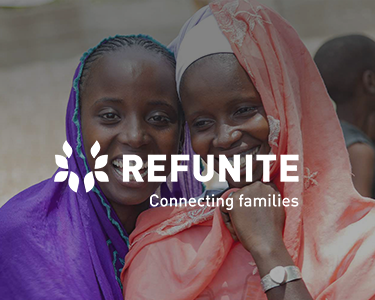Descending through the thin layer of clouds, the arid landscape of Dadaab appears below, pockmarked by the blue tents of the UNHCR hosting weary refugees. As we approach the short landing strip, the warm winds rising rattle the little propeller plane, dipping the wings on either side.
Having left behind chilly Nairobi at 6 am, the warmth of Dadaab is a brief respite for my freezing toes, though soon, I, along with everyone else, wish for cooler weather – even during this winter “chill.”
I disembark with a flurry of butterflies and head off to greet our partners, the wonderful Refugee Consortium of Kenya – my hosts for the next couple of days. Refugees United is working with RCK, helping refugees in search of missing family sign up to the www.refunite.org tracing platform to help families reconnect. More than 12,000 refugees in Dadaab alone have so far signed up, with endless thousands more waiting to be assisted. A lot of work lies ahead.
While I acclimatize myself to the dry heat of Dadaab, we spend the first hours paying visits to the various organizations also operating in the camp, and I soak up as much as I can in terms of how things operate. Soon, we head out to the first camp – Hagadera. (Dadaab is made up of three sub-camps, Dagahaley, Hagadera and Ifo 1 and 2, with 2 not currently in use. A new extension is being opened to house the massive influx.)
Though having tried to mentally prepare myself for the meeting with 440.000 refugees, I am still floored by what greets me.
With several thousands of refugees arriving every day, long lines of people are queuing up, while the UNHCR, the Department of Refugee Affairs and others labor to help them as quickly as possible, picking up the most vulnerable for medical attention and care. Problem is, every single person in these lines is emaciated, destroyed from several weeks of walking through the heat, ravished by disease, hunger, Al-Shabaab and wild animals. I learn of a group of women and children who just days before had been mauled by hungry lions as they trekked towards Kenya.
Women and children make up the by far largest proportion of arrivals, with many of the children being toddlers, some only a few days old, born in the scrubs, swathed in dirty scarves to protect them from the oppressive sun. The breasts of their mothers too meager to provide any sustenance, this harsh welcome to the world leaves them devastatingly close to death just days into their life.
Speaking with refugees there, I learn that a worryingly high number of families have become separated during their escape, as people flee towards Yemen, Djibouti, Ethiopia and Kenya. Moreover, many have had to put their children on any passing car in the hopes they make it to safety. Many have had to leave their families behind on the road, some alive, most dead. Parents have buried 1, 2, 3 or 5 of their children, giving in to hunger, sitting down, tipping over into death. Only the strongest have made it. How painful this life can be.
After our interviews and inspection of some of the Refugees United outposts for refugees searching for loved ones, we leave one camp for another, trailed by military escorts as the threat of Al-Shabaab lurks beyond the protected perimeters of each camp. Travel takes place in white convoys of jeeps.
Everywhere you look scraps of plastic cling to trees, billowing in the wind like torn pirates flags and through every part of Dadaab, a smell of burnt plastic hangs heavily in the air.
Driving through the sandy surroundings, the marabou stork, these gentlemen without a top hat, are a constant companion. Their gangly legs, rough-skinned necks and dirty bills are omnipresent, as they seemingly are one of the few animals designed to thrive in this inhospitable climate. (Later on, as a cute little cat sidles up to me at a restaurant surrounded by these stalkers, I fear they’ll corner it and gulp it down. Mean looking bastards.)
Arriving at the next camp, at the front of the registration center, hundreds of refugees, women, men and children, crowd the gates, bony fingers holding on to the rusted bars. As our white jeep pulls up, the people part like the sea before Moses, and sullen eyes try and judge whether these gods are benevolent. Never before has the contrast between our fortunes been starker. I look ahead, try not to catch the searching eyes of those we pass by, knowing there is no immediate help I can offer.
Inside, I spent some time with the impressive RU employees, all young Somali refugees, helping us reach, educate and assist refugees in search of missing family use our tracing systems. I admire the zest they have for life despite the circumstances they’ve been given, admire their determination to make something of themselves, of their community, despite such little promise in sight. I learn so much about our operations, what works and what doesn’t work, what we can do to make their jobs easier, to help more people. I hear about some of the families we assist, learn about people who have now found missing loved ones through Refugees United after years of searching; a shot of joy in an otherwise dark world.
I am here to learn, to better understand. I ask of our employees to shoot freely in telling me how Refugees United can do better, what their needs are. An obvious point is the need for more hands to assist the many in search of loved ones. (Our first research among new arrivals in Dadaab show that more than 50% have lost touch with immediate family during their trek towards safety. It is a staggering number, and one I wonder how we can accommodate.)
Exhausted we return to our compound that night, hosted by the Kenyan Department of Refugee Affairs. As I write this in my warm little room, a goat bleating outside, the power was just cut. I look down at my feet spotting fluorescent skulls on my havaiana flip-flops lighting up in the dark — ironic in this setting. I disappear into the penumbra beyond the computer screen’s glow, waiting for the whirr of the generator to kick back in and for sleep to come find me.
Best,
Christopher and the RU Team


